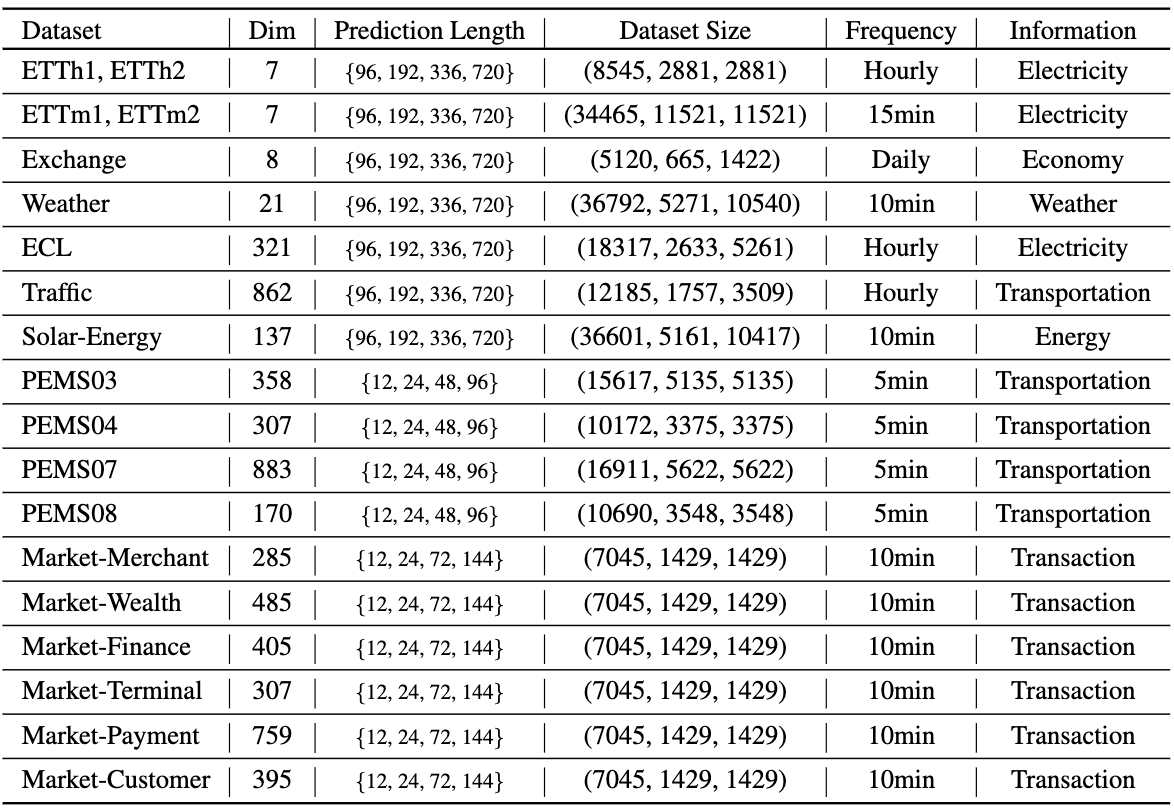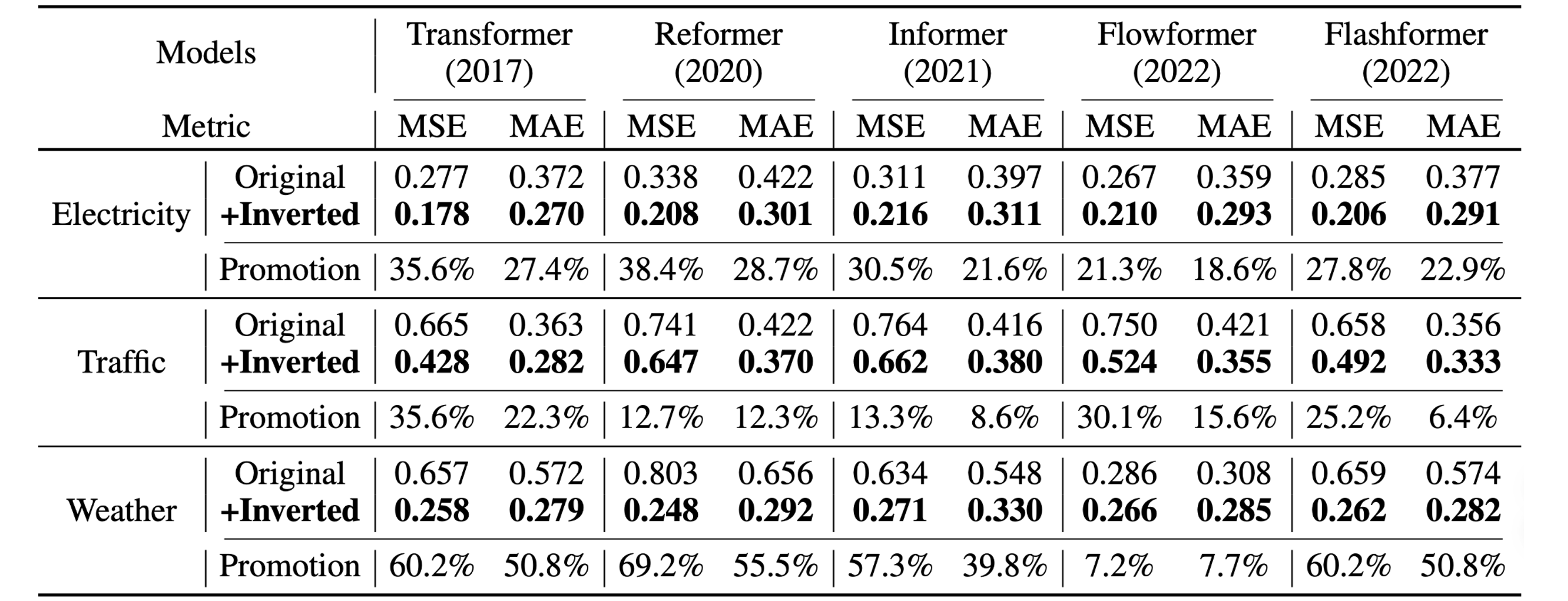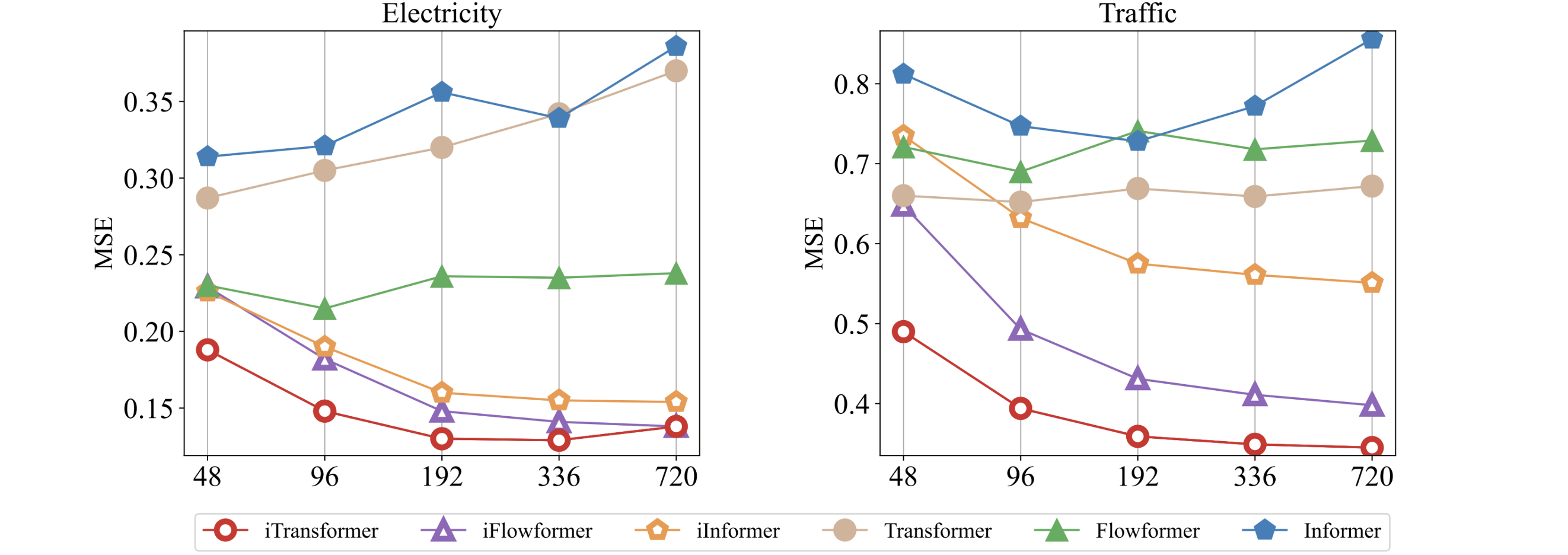The repo is the official implementation for the paper: iTransformer: Inverted Transformers Are Effective for Time Series Forecasting. It currently includes code implementations for the following tasks:
Multivariate Forecasting: We provide all scripts as well as datasets for the reproduction of forecasting results in this repo.
Boosting Forecasting of Transformers: iTransformer framework can consistently promote Transformer variants, and take advantage of the booming efficient attention mechanisms.
Generalization on Unseen Variates: iTransformer is demonstrated to generalize well on unseen time series, making it a nice alternative as the fundamental backbone of the large time series model.
Better Utilization of Lookback Windows: While Transformer does not necessarily benefit from the larger lookback window, inverted Transformers exhibit better utilization of the enlarged lookback window.
Adopt Efficient Attention and Training Strategy: By inverting, efficient attention mechanisms and strategy can be leveraged to reduce the complexity of high-dimensional time series.
🚩 News (2024.03) Introduction of our work in Chinese is available.
🚩 News (2024.02) iTransformer has been accepted as ICLR 2024 Spotlight.
🚩 News (2023.12) iTransformer available in GluonTS with probablistic emission head and support for static covariates.
🚩 News (2023.12) We received lots of valuable suggestions. A revised version (24 Pages) is now available, which includes extensive experiments, intuitive cases, in-depth analysis and further improvement of our work.
🚩 News (2023.10) iTransformer has been included in [Time-Series-Library] and achieve the consistent state-of-the-art in long-term time series forecasting.
🚩 News (2023.10) All the scripts for the above tasks in our paper are available in this repo.
🌟 Considering the characteristics of multivariate time series, iTransformer breaks the conventional model structure without the burden of modifying any Transformer modules. Inverted Transformer is all you need in MTSF.
🏆 iTransformer achieves the comprehensive state-of-the-art in challenging multivariate forecasting tasks and solves several pain points of Transformer on extensive time series data.
😊 iTransformer is repurposed on the vanilla Transformer. We think the "passionate modification" of Transformer has got too much attention in the research area of time series. Hopefully, the mainstream work in the following can focus more on the dataset infrastructure and consider the scale-up ability of Transformer.
iTransformer regards independent time series as variate tokens to capture multivariate correlations by attention and utilize layernorm and feed-forward networks to learn series representations.
The pseudo-code of iTransformer is as simple as the following:
- Install Pytorch and necessary dependencies.
pip install -r requirements.txt
-
The datasets can be obtained from Google Drive or Tsinghua Cloud.
-
Train and evaluate the model. We provide all the above tasks under the folder ./scripts/. You can reproduce the results as the following examples:
# Multivariate forecasting with iTransformer
bash ./scripts/multivariate_forecasting/Traffic/iTransformer.sh
# Compare the performance of Transformer and iTransformer
bash ./scripts/boost_performance/Weather/iTransformer.sh
# Train the model with partial variates, and generalize on the unseen variates
bash ./scripts/variate_generalization/Electricity/iTransformer.sh
# Test the performance on the enlarged lookback window
bash ./scripts/increasing_lookback/Traffic/iTransformer.sh
# Utilize FlashAttention for acceleration
bash ./scripts/efficient_attentions/iFlashTransformer.sh
We evaluate the iTransformer on extensive challenging multivariate forecasting benchmarks as well as the server load prediction of Alipay online transactions (generally hundreds of variates, denoted as Dim). Comprehensive good performance (MSE/MAE) is achieved by iTransformer. iTransformer is particularly good at forecasting high-dimensional time series.
By introducing the proposed framework, Transformer and its variants achieve significant performance improvement, demonstrating the generality of the iTransformer approach and benefiting from efficient attention mechanisms.
Technically, iTransformer can forecast with arbitrary numbers of variables during inference. We partition the variates of each dataset into five folders, train models with 20% variates, and use the partially trained model to forecast all varieties. iTransformers can be trained efficiently and forecast unseen variates with good generalizability.
While previous Transformers do not necessarily benefit from the increase of historical observation. iTransformers show a surprising improvement in forecasting performance with the increasing length of the lookback window.
Benefiting from inverted Transformer modules:
- (Left) Inverted Transformers learn better time series representations (more similar CKA) favored by time series forecasting.
- (Right) The inverted self-attention module learns interpretable multivariate correlations.
- Visualization of the variates from Market and the learned multivariate correlations. Each variate represents the monitored interface values of an application, and the applications can be further grouped into refined categories.
iTransformer that utilizes attention on variate dimensions and feed-forward on temporal dimension generally achieves the best performance. However, the performance of vanilla Transformer (the third row) performs the worst among these designs, indicating the disaccord of responsibility when the conventional architecture is adopted.
We propose a training strategy for multivariate series by taking advantage of its variate generation ability. While the performance (Left) remains stable on partially trained variates of each batch with the sampled ratios, the memory footprint (Right) of the training process can be cut off significantly.
If you find this repo helpful, please cite our paper.
@article{liu2023itransformer,
title={iTransformer: Inverted Transformers Are Effective for Time Series Forecasting},
author={Liu, Yong and Hu, Tengge and Zhang, Haoran and Wu, Haixu and Wang, Shiyu and Ma, Lintao and Long, Mingsheng},
journal={arXiv preprint arXiv:2310.06625},
year={2023}
}
We appreciate the following GitHub repos a lot for their valuable code and efforts.
- Reformer (https://github.com/lucidrains/reformer-pytorch)
- Informer (https://github.com/zhouhaoyi/Informer2020)
- FlashAttention (https://github.com/shreyansh26/FlashAttention-PyTorch)
- Autoformer (https://github.com/thuml/Autoformer)
- Stationary (https://github.com/thuml/Nonstationary_Transformers)
- Time-Series-Library (https://github.com/thuml/Time-Series-Library)
If you have any questions or want to use the code, feel free to contact:
- Yong Liu (liuyong21@mails.tsinghua.edu.cn)
- Haoran Zhang (z-hr20@mails.tsinghua.edu.cn)













